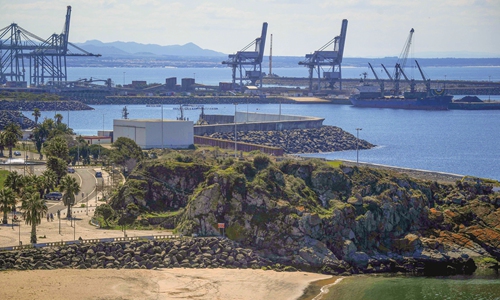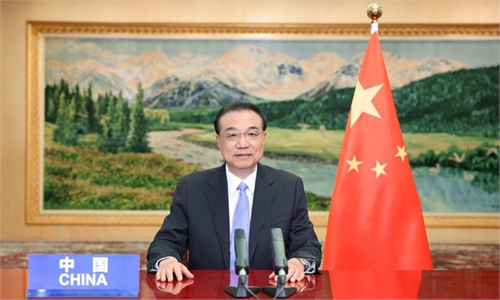China, Portuguese-speaking nations to deepen agricultural cooperation amid global food security risks

A picture taken on April 6, 2022 shows part of the Sines' Port in Sines, Portugal. The port is one of the key trade points between China and Western Europe. Photo: VCG
Editor's Note:
In 2013, Chinese President Xi Jinping put forward the "Belt and Road Initiative" (BRI), aiming at building a new platform for international cooperation and creating new momentum for shared development. Portugal is the first country in Western Europe to join the China-proposed initiative, with a majority of the world's other seven Portuguese-speaking countries also becoming vital components of the mega scheme to date. The Global Times (GT) recently spoke with Francisco José Leandro (Francisco Leandro), Associate Professor and Associate Dean at Institute for Research on Portuguese-speaking Countries in City University of Macau, sharing his view on the future development of BRICS scheme and how China and Portuguese-speaking countries shall join hands to cope with rising global uncertainty. This is the third in a series scoping the views of foreign experts on the remarkable contribution made by the BRI and China - the world's second-largest economy - to global development over the past 10 years.
Francisco Leandro: BRICS is important not only because it represents 40 percent of the population and 25 percent of global GDP, but also they make contribution to global development.
After the first decade, BRICS cooperation has achieved remarkable results. On the financial front, the BRICS countries established the New Development Bank (NDB), providing infrastructure financing for member states as well as developing countries. The NDB, the "BRICS Plus" mechanism and the inclusion of new members are three significant directions for the future development of the BRICS.
GT: How do you view the relations between China-proposed BRI and other global infrastructure plans launched by the US and EU?
Francisco Leandro: Other projects like the B3W, Global Gateway may compete with BRI. We need to continue to study the BRI and other new initiatives to find synergies. There's a huge potential for cooperation between these initiatives. We need all of these because they are instruments that can push us forward to fight against poverty and diseases.
There will be competition, that's normal. Competition is not bad, but it is very important that we do not escalate the competition to transform it into a kind of economic war.
GT: How do you assess the economic and trade cooperation between China and Portuguese-speaking countries in recent years, especially with Portugal?
Francisco Leandro: The economic and trade cooperation between China and these countries especially Portugal has been growing. Among the nine Portuguese-speaking countries and regions, there are four that are of huge trade volume in terms of this relationship. One of them is Brazil, probably the strongest one, as 80 percent of the Brazil's export is coming to China. And then is Angola, of which 40 percent of the export coming to China. Portugal has 20 percent and finally Mozambique.
The relationship between Portuguese-speaking countries and China is not only about bilateral relations, but it's also very much about the regional integration of these countries in their own regional community. China has a market of 1.4 billion people, and if you put all these nine regional communities together, we have an almost three-billion market size.
There is also huge potential to be tapped in terms of China-Portugal relations. China is investing in a lot of sectors in Portugal including energy, health care, banking and insurance. The two countries could cooperate in areas like nanotechnology especially for satellites applications in the future.
Moreover, the blue economy is probably the most promising area of the bilateral cooperation. Portugal and China have signed the only blue partnership in the world and this is probably what we will see very interesting developments in the next few years. Portugal is now applying for extension of the continental platform which will enlarge the exclusive economic zone.
The clean energy is the future and the transition of new forms of energy is important. Portugal is the first European country to establish a plan of production of hydrogen while China is one of the largest consumers of energy and the largest producer of solar and wind energy in the world, making huge efforts to use more and more clean energy. In 2022, 59 percent of the energy consumed in Portugal came from clean sources. In Brazil, 40 percent came from clean energy. Now China is involved in the construction of a bio mass plant in Guinea-Bissau. This is the way for the future and energy will be on the top of the agenda for China and the Portuguese-speaking countries.
GT: What projects have been carried out between China and Portuguese-speaking countries under the BRI?
Francisco Leandro: All Portuguese-speaking countries except Brazil, Guinea-Bissau and Cabo Verde have signed agreements with China to join the BRI. There are many things being done under the framework of the BRI. The first one is the design of economic corridors. China has built six land corridors and three maritime blue passages.
Also, we have witnessed a number of infrastructure projects that have been considering or even been delivered in the light of the BRI.
There are 20 deep sea ports belonging to the Portuguese-speaking countries that China is involved in different manners like investment, management or technology.
Another example is the creation of special economic zones. Putting Brazil and Portugal aside, the Portuguese-speaking countries have 24 special economic zones being developed, five of which have the participation of China.
When we talk about the BRI, it is not only about infrastructure construction including sea ports, airports, highways and railways, but also other dimensions like a new campus supported by China in Sao Tome Island, which is also a very important and meaningful example delivered under the BRI.
GT: What role has Macao Special Administrative Region (SAR) and the Greater Bay Area played in promoting economic cooperation between China and Portuguese-speaking countries?
Francisco Leandro: Macao SAR has enhanced ties between these countries with China, promoting culture exchange, promoting people to people sharing knowledge. Moreover, it provides institutes to precisely facilitate the entry of Portuguese-speaking countries to the Chinese mainland.
The banking and education sectors are very important roles in all the support of development. Macao SAR has many banks such as Bank of China and Banco Nacional Ultramarino, which are well equipped to provide this support. The major problem of Portuguese-speaking countries with the exception of Portugal and Brazil is education. We have 10 universities in Macao and most of time we use three languages: Chinese, English and Portuguese.
GT: How will Russia-Ukraine conflict impact Portuguese-speaking countries?
Francisco Leandro: Russia-Ukraine tensions have had an impact on the global situation. The first one is political risk. If the tensions drag on too long, this will have an impact on relations between China and EU.
Moreover, the conflict pushes us to think more about the supply of energy. Angola and other Portuguese-speaking countries have huge amount of oil and they may be eyeing more development opportunities in terms of energy as the price of oil goes up.
In terms of food security, there could be a better agricultural cooperation between China and these Portuguese-speaking countries. Brazil is already very developed in this area, with a strong commercial relationship with China, but there are two other countries, Angola and Mozambique, that also are very strong but not developed as they should be. They are very strong in agricultural sector, especially Mozambique has a lot of water, which is fundamental for agriculture.

